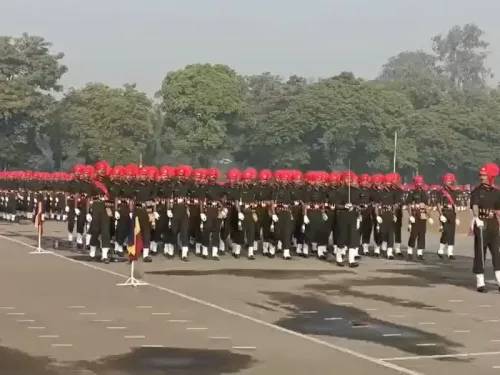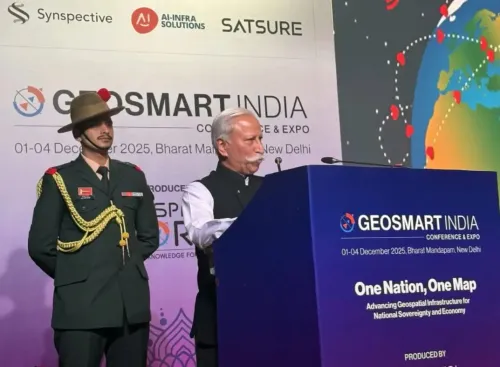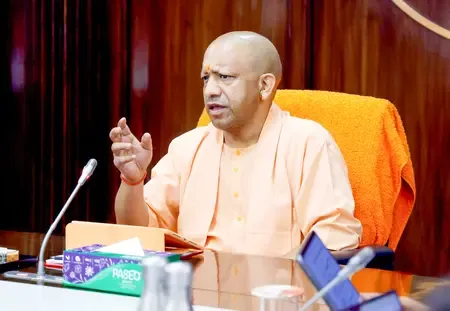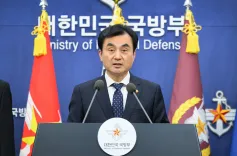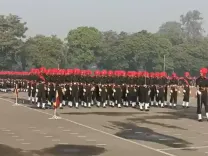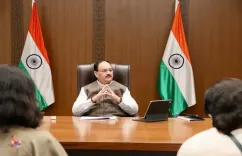Will Maoists be allowed to sleep during monsoon?
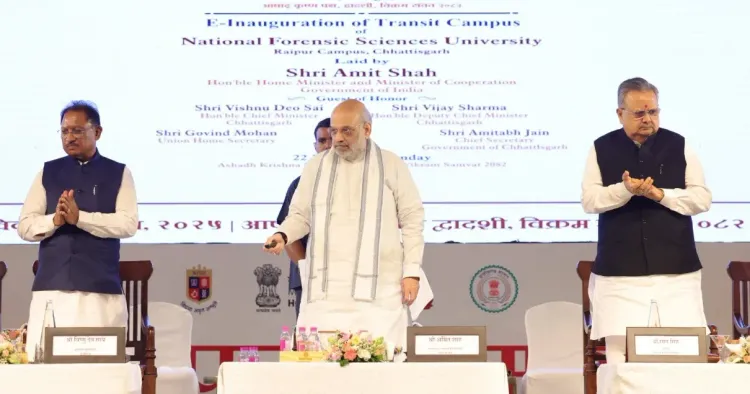
Synopsis
Key Takeaways
- Commitment to end Maoism by March 31, 2026.
- Encouragement for Maoist cadres to surrender and join the mainstream.
- Investment of ₹268 crore in forensic education and infrastructure.
- 32,000 forensic professionals to be trained annually.
- Focus on youth entrepreneurship for Chhattisgarh's development.
Raipur, June 22 (NationPress) In a resolute address delivered in Nava Raipur, Chhattisgarh on Sunday, Union Home Minister Amit Shah reiterated the government's determination to eradicate Maoism from India by March 31, 2026. “This time,” he proclaimed, “we will not let them sleep through the monsoon—there will be no further dialogue.” During his speech, HM Shah once again urged Maoist militants to abandon their violent ways and reintegrate into society, promising that the government would honor its commitments under the state’s surrender policy.
“Many have already chosen peace,” he noted. “We will extend more than what was promised—but only if violence is forsaken and you join in shaping a new Chhattisgarh.” He also encouraged the youth of Chhattisgarh to seize the burgeoning opportunities in forensic science, describing it as a 'sunrise industry' with vast potential for meaningful careers.
These remarks were made during the ceremony for laying the foundation stone of the National Forensic Sciences University (NFSU) campus and the Central Forensic Science Laboratory (CFSL) in Naya Raipur. The ₹268 crore project—₹145 crore for NFSU and ₹123 crore for CFSL—is part of a national strategy aimed at modernizing the criminal justice system through evidence-based policing and forensic-led investigations.
HM Shah called the day a landmark moment for Chhattisgarh’s justice infrastructure, stating that these new institutions would benefit not just the state but all of central India. The NFSU transit campus is set to offer undergraduate and postgraduate courses from 2025-26 across various forensic disciplines, with HM Shah asserting that “an NFSU degree means a guaranteed job.”
The Centre's goal is to train 32,000 forensic professionals annually across 26 campuses nationwide; seven have already been opened, with ten proposed and nine sanctioned.
He underscored the economic potential of the forensic industry, noting that the global forensic technology market—currently valued at $20 billion—is growing at an annual rate of 13 percent and is expected to reach $55 billion by 2036, with India contributing 9 percent to this growth.
HM Shah further stressed the importance of youth-driven entrepreneurship in Chhattisgarh’s progress. Following the launch of the state’s Innovation Hub (i-Hub), he highlighted a ₹5,000 crore Memorandum of Understanding signed at an investment summit led by Chief Minister Vishnu Deo Sai. While welcoming industrial interest, he emphasized that true progress will come when young people take the lead as entrepreneurs and cultivate an industrial mindset.
The i-Hub is described as a launchpad for innovation, providing both technical and financial backing to aspiring entrepreneurs, particularly within the MSME sector. “Industries are arriving,” he stated, “but Chhattisgarh will only witness real development when its youth lead the way.”
This event also celebrated the 25th anniversary of the formation of Chhattisgarh, marked as Atal Nirman Varsh. “Atal ji created Chhattisgarh, and under Narendra Modi ji, we will take it to new heights,” HM Shah proclaimed. He commended the state government for its quick implementation of newly enacted criminal laws—Bharatiya Nyaya Sanhita (BNS), Bharatiya Nagarik Suraksha Sanhita (BNSS), and Bharatiya Sakshya Adhiniyam (BSA)—aiming to ensure that justice is served within three years of filing an FIR. The Union Home Minister is currently on a two-day visit to Chhattisgarh.


